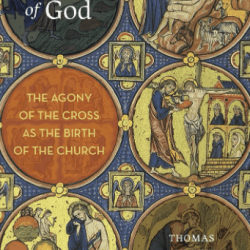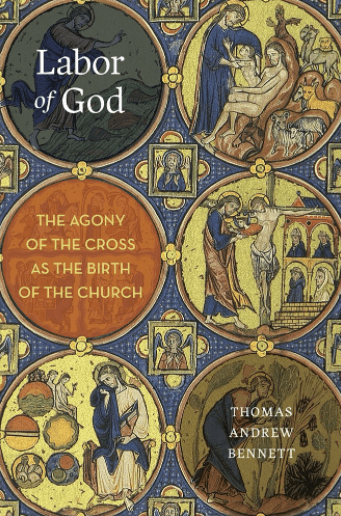Perhaps the most perplexing issue in the historical Jesus debate of the last two decades was how to make a solid connection between Jesus’ kingdom vision and the crucifixion as an atoning death. How, some of us were asking, do we get from Luke 4:16-30, Jesus’ inaugural kingdom sketch, to Romans 3:21-26? Many historical Jesus scholars said there was no sound connection — those early Christians more or less made that atonement theology up because it did not come from Jesus. Others suggested Jesus died a tragic life because he was in the wrong place at the wrong time; others said it shows his exemplary love. A more recent view is that Jesus was the ultimate scapegoat who exposed the sickness of the systemic powers. In Tom Wright’s new book Simply Jesus: A New Vision of Who He Was, What He Did, and Why He Matters, he provides the fullest expression of his view on how to tie kingdom to cross as atoning. (If you’d like to see my view, you can read it at Jesus and His Death.)
 He goes fast — you can read it on pp. 179-189 — and I will try to capture it in an even simpler sketch. It can be called a “new/fresh perspective on the cross.”
He goes fast — you can read it on pp. 179-189 — and I will try to capture it in an even simpler sketch. It can be called a “new/fresh perspective on the cross.”
How does Tom Wright’s sketch here help us in the atonement theory discussion? Does this take us forward?
Jesus over and over anticipated his own death, and in Mark 10:45 he opens up new soil by showing that his death will be a new kind of power. When Passover came Jesus revealed even more, and to do so he gave his followers a meal — “with a radical difference” (180). This mean pointed forward (not just backward) to the great sacrifice; is the real Exodus; the real return from exile; the new covenant; sins would be forgiven; a great jubilee moment; the era of blessing. His disciples participate in that event by sharing the meal. This is a new kind of presence of God — in bread and wine. It is a new Temple, and a new vocation as the royal priesthood.
“Jesus has taken Israel’s destiny upon himself and will now take Israel’s fate upon himself, so that Israel’s vocation can be accomplished” (181). He finds this best sketched in John 18-19 [after the jump I have the whole text], and he shows the interplay of Rome, Jewish leaders and the love of God in the cross.
So what models are we to use? Tom says it is easy to belittle the death: man crushed by system, example of love, just representative, transaction … yet, each of these says something right: he is an example, it is love, he did represent, there is a penal representation and substitution… but… there’s more, and if we want to get inside Jesus and his time to see what he was doing we need to explore this:
The death of Jesus was God’s peculiar way of establishing that God was becoming king in Jesus. This all means that the real enemy was not Rome, but the Accuser and death. “All the strands of evil throughout human history…” converge on Jesus at the cross. He has taken all those accusations and “borne them himself” (187). The three winds — Rome, Israel and God’s new motion — need a fourth: the whirlpool downward vortex dragging all humans into the consequences of sin and death and accusations. Rome and Israel’s leaders, Wright claims, are the unwitting tools of Satan. This is the one last battle.
“Jesus… to take the full power of evil and accusation upon himself, to let it do its worst to him, so that it would thereby be exhausted, its main force spent” (188).
That death then was the powers of evil against God, it was Jesus as a representative substitute and it was an act of magnificent love whereby Jesus entered into the battle in order to gain the victory over sin and death and the devil.
John 18–19, sorry for the lower case letters that are note references in the text I’m using.
John 18:1 When he had finished praying, Jesus left with his disciples and crossed the Kidron Valley.a On the other side there was a garden,b and he and his disciples went into it.c
John 18:2 Now Judas, who betrayed him, knew the place, because Jesus had often met there with his disciples.a 3 So Judas came to the garden, guidinga a detachment of soldiers and some officials from the chief priests and the Pharisees.b They were carrying torches, lanterns and weapons.
John 18:4 Jesus, knowing all that was going to happen to him,a went out and asked them, “Who is it you want?”b
John 18:5 “Jesus of Nazareth,”a they replied.
“I am he,” Jesus said. (And Judas the traitor was standing there with them.)
6 When Jesus said, “I am he,” they drew back and fell to the ground.
John 18:7 Again he asked them, “Who is it you want?”a
“Jesus of Nazareth,” they said.
John 18:8 Jesus answered, “I told you that I am he. If you are looking for me, then let these men go.” 9 This happened so that the words he had spoken would be fulfilled: “I have not lost one of those you gave me.”a a
John 18:10 Then Simon Peter, who had a sword, drew it and struck the high priest’s servant, cutting off his right ear. (The servant’s name was Malchus.)
John 18:11 Jesus commanded Peter, “Put your sword away! Shall I not drink the cupa the Father has given me?”
John 18:12 Then the detachment of soldiers with its commander and the Jewish officialsa arrested Jesus. They bound him 13 and brought him first to Annas, who was the father-in-law of Caiaphas,a the high priest that year. 14 Caiaphas was the one who had advised the Jewish leaders that it would be good if one man died for the people.a
John 18:15 Simon Peter and another disciple were following Jesus. Because this disciple was known to the high priest,a he went with Jesus into the high priest’s courtyard,b 16 but Peter had to wait outside at the door. The other disciple, who was known to the high priest, came back, spoke to the servant girl on duty there and brought Peter in.
John 18:17 “You aren’t one of this man’s disciples too, are you?” she asked Peter.
He replied, “I am not.”a
John 18:18 It was cold, and the servants and officials stood around a firea they had made to keep warm. Peter also was standing with them, warming himself.b
John 18:19 Meanwhile, the high priest questioned Jesus about his disciples and his teaching.
John 18:20 “I have spoken openly to the world,” Jesus replied. “I always taught in synagoguesa or at the temple,b where all the Jews come together. I said nothing in secret.c 21 Why question me? Ask those who heard me. Surely they know what I said.”
John 18:22 When Jesus said this, one of the officialsa nearby slapped him in the face.b “Is this the way you answer the high priest?” he demanded.
John 18:23 “If I said something wrong,” Jesus replied, “testify as to what is wrong. But if I spoke the truth, why did you strike me?”a 24 Then Annas sent him bound to Caiaphasa the high priest.
John 18:25 Meanwhile, Simon Peter was still standing there warming himself.a So they asked him, “You aren’t one of his disciples too, are you?”
He denied it, saying, “I am not.”b
John 18:26 One of the high priest’s servants, a relative of the man whose ear Peter had cut off,a challenged him, “Didn’t I see you with him in the garden?”b 27 Again Peter denied it, and at that moment a rooster began to crow.a
John 18:28 Then the Jewish leaders took Jesus from Caiaphas to the palace of the Roman governor.a By now it was early morning, and to avoid ceremonial uncleanness they did not enter the palace,b because they wanted to be able to eat the Passover.c 29 So Pilate came out to them and asked, “What charges are you bringing against this man?”
John 18:30 “If he were not a criminal,” they replied, “we would not have handed him over to you.”
John 18:31 Pilate said, “Take him yourselves and judge him by your own law.”
“But we have no right to execute anyone,” they objected.
32 This took place to fulfill what Jesus had said about the kind of death he was going to die.a
John 18:33 Pilate then went back inside the palace,a summoned Jesus and asked him, “Are you the king of the Jews?”b
John 18:34 “Is that your own idea,” Jesus asked, “or did others talk to you about me?”
John 18:35 “Am I a Jew?” Pilate replied. “Your own people and chief priests handed you over to me. What is it you have done?”
John 18:36 Jesus said, “My kingdoma is not of this world. If it were, my servants would fight to prevent my arrest by the Jewish leaders.b But now my kingdom is from another place.”c
John 18:37 “You are a king, then!” said Pilate.
Jesus answered, “You say that I am a king. In fact, the reason I was born and came into the world is to testify to the truth.a Everyone on the side of truth listens to me.”b
John 18:38 “What is truth?” retorted Pilate. With this he went out again to the Jews gathered there and said, “I find no basis for a charge against him.a 39 But it is your custom for me to release to you one prisoner at the time of the Passover. Do you want me to release ‘the king of the Jews’?”
John 18:40 They shouted back, “No, not him! Give us Barabbas!” Now Barabbas had taken part in an uprising.a
John 19:1 Then Pilate took Jesus and had him flogged.a 2 The soldiers twisted together a crown of thorns and put it on his head. They clothed him in a purple robe 3 and went up to him again and again, saying, “Hail, king of the Jews!”a And they slapped him in the face.b
John 19:4 Once more Pilate came out and said to the Jews gathered there, “Look, I am bringing him outa to you to let you know that I find no basis for a charge against him.”b 5 When Jesus came out wearing the crown of thorns and the purple robe,a Pilate said to them, “Here is the man!”
John 19:6 As soon as the chief priests and their officials saw him, they shouted, “Crucify! Crucify!”
But Pilate answered, “You take him and crucify him.a As for me, I find no basis for a charge against him.”b
John 19:7 The Jewish leaders insisted, “We have a law, and according to that law he must die,a because he claimed to be the Son of God.”b
John 19:8 When Pilate heard this, he was even more afraid, 9 and he went back inside the palace.a “Where do you come from?” he asked Jesus, but Jesus gave him no answer.b 10 “Do you refuse to speak to me?” Pilate said. “Don’t you realize I have power either to free you or to crucify you?”
John 19:11 Jesus answered, “You would have no power over me if it were not given to you from above.a Therefore the one who handed me over to youb is guilty of a greater sin.”
John 19:12 From then on, Pilate tried to set Jesus free, but the Jewish leaders kept shouting, “If you let this man go, you are no friend of Caesar. Anyone who claims to be a kinga opposes Caesar.”
John 19:13 When Pilate heard this, he brought Jesus out and sat down on the judge’s seata at a place known as the Stone Pavement (which in Aramaicb is Gabbatha). 14 It was the day of Preparationa of the Passover; it was about noon.b
“Here is your king,”c Pilate said to the Jews.
John 19:15 But they shouted, “Take him away! Take him away! Crucify him!”
“Shall I crucify your king?” Pilate asked.
“We have no king but Caesar,” the chief priests answered.
John 19:16 Finally Pilate handed him over to them to be crucified.a
So the soldiers took charge of Jesus.
17 Carrying his own cross,a he went out to the place of the Skullb (which in Aramaicc is called Golgotha). 18 There they crucified him, and with him two othersa—one on each side and Jesus in the middle.
John 19:19 Pilate had a notice prepared and fastened to the cross. It read: JESUS OF NAZARETH,a THE KING OF THE JEWS.b 20 Many of the Jews read this sign, for the place where Jesus was crucified was near the city,a and the sign was written in Aramaic, Latin and Greek. 21 The chief priests of the Jews protested to Pilate, “Do not write ‘The King of the Jews,’ but that this man claimed to be king of the Jews.”a
John 19:22 Pilate answered, “What I have written, I have written.”
John 19:23 When the soldiers crucified Jesus, they took his clothes, dividing them into four shares, one for each of them, with the undergarment remaining. This garment was seamless, woven in one piece from top to bottom.
John 19:24 “Let’s not tear it,” they said to one another. “Let’s decide by lot who will get it.”
This happened that the scripture might be fulfilleda that said,
“They divided my clothes among them
and cast lots for my garment.”a b
So this is what the soldiers did.
John 19:25 Near the crossa of Jesus stood his mother,b his mother’s sister, Mary the wife of Clopas, and Mary Magdalene.c 26 When Jesus saw his mothera there, and the disciple whom he lovedb standing nearby, he said to her, “Woman,a here is your son,” 27 and to the disciple, “Here is your mother.” From that time on, this disciple took her into his home.
John 19:28 Later, knowing that everything had now been finished,a and so that Scripture would be fulfilled,b Jesus said, “I am thirsty.” 29 A jar of wine vinegara was there, so they soaked a sponge in it, put the sponge on a stalk of the hyssop plant, and lifted it to Jesus’ lips. 30 When he had received the drink, Jesus said, “It is finished.”a With that, he bowed his head and gave up his spirit.
John 19:31 Now it was the day of Preparation,a and the next day was to be a special Sabbath. Because the Jewish leaders did not want the bodies left on the crossesb during the Sabbath, they asked Pilate to have the legs broken and the bodies taken down. 32 The soldiers therefore came and broke the legs of the first man who had been crucified with Jesus, and then those of the other.a 33 But when they came to Jesus and found that he was already dead, they did not break his legs. 34 Instead, one of the soldiers pierceda Jesus’ side with a spear, bringing a sudden flow of blood and water.b 35 The man who saw ita has given testimony, and his testimony is true.b He knows that he tells the truth, and he testifies so that you also may believe. 36 These things happened so that the scripture would be fulfilled:a “Not one of his bones will be broken,”a b 37 and, as another scripture says, “They will look on the one they have pierced.”a a
John 19:38 Later, Joseph of Arimathea asked Pilate for the body of Jesus. Now Joseph was a disciple of Jesus, but secretly because he feared the Jewish leaders.a With Pilate’s permission, he came and took the body away. 39 He was accompanied by Nicodemus,a the man who earlier had visited Jesus at night. Nicodemus brought a mixture of myrrh and aloes, about seventy-five pounds.a 40 Taking Jesus’ body, the two of them wrapped it, with the spices, in strips of linen.a This was in accordance with Jewish burial customs.b 41 At the place where Jesus was crucified, there was a garden, and in the garden a new tomb, in which no one had ever been laid. 42 Because it was the Jewish day of Preparationa and since the tomb was nearby,b they laid Jesus there.










